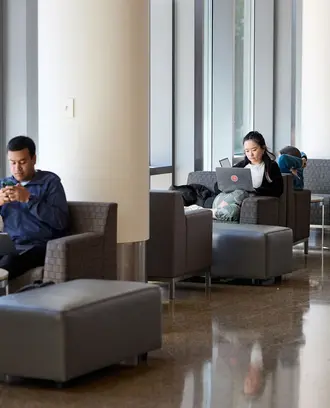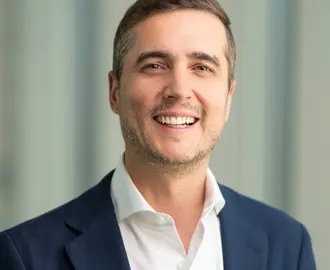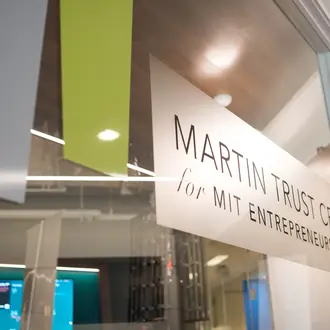Candice Creecy, SFMBA ’22, is a consultant at McKinsey & Company focusing on life sciences and healthcare. She's also an emergency medicine physician assistant at Brigham and Women’s Hospital. After earning a B.S. in Kinesiology from Colorado State University-Pueblo, she was commissioned as a U.S. Marine Corps officer, earning her Naval Flight Officer aviation wings while serving as an F/A-18 Weapons Systems Officer.
After 12 years in the active-duty Marine Corps, Candice accepted a commission in the U.S. Marine Corps Reserve to attend Wake Forest School of Medicine where she earned a MMSc in Physician Assistant Studies. Upon graduation, Candice completed the 18-month Mayo Clinic Emergency Medicine PA Fellowship and now serves in the United States Marine Corps Reserve as Operations Officer and JTAC Evaluator for 6th Air Naval Gunfire Liaison Company. She graduated from the MIT Sloan Fellows MBA in 2022.
Candice Creecy, SFMBA '22
You had not one but two demanding careers, and you and your wife just had a baby. Knee-deep in all those responsibilities, what prompted you to apply to the MIT Sloan Fellows program?
Ha! It’s true. I do love high-pressure situations. Emergency rooms. Jet aviation. Joining a high-powered MIT program with an infant at home. And yes, the idea of conquering the SFMBA was a factor, but my real goal entering the program was to amass the tools I needed to influence positive change in the healthcare system. I was in my Emergency Medicine Fellowship at Mayo Clinic at the start of the COVID-19 pandemic and saw firsthand the difficulties rural healthcare systems face in a resource-constrained environment. Mayo Clinic is undoubtedly the best healthcare system in the world, but even within their realm there was a real concern that we would have to choose who to place on a ventilator if or when the time came.
Why did you choose this program for fixing the healthcare system rather than a public health program?
The answer to most challenges requires the integration of science and technology with leadership and management. Many challenges in healthcare also require a knowledge of biotech, policy, and finance. MIT encompasses all those disciplines. I love being in the ER and providing acute care to patients in immediate need, but what if we can disrupt healthcare from a higher level and keep people out of the ER in the first place? Can we solve the root problems of many chronic illnesses through innovations or policy changes? As a Sloan Fellow, I was surrounded by the most advanced thinking in healthcare at MIT and at some of the best hospitals in the world. I also was drawn to this program because of the deeply international cohort. I wanted to hear firsthand about healthcare systems in other parts of the world, their challenges, and solutions.
You have two demanding careers that require a great deal of expertise. What did you learn in the MIT Sloan Fellows MBA that you didn’t learn in your previous roles?
For one thing, learning how to speak business. When you come from the medical and military environments, you don’t pick up all the terminology from the broader worlds of business and finance. When I first started as a Sloan Fellow, there were so many terms and practices I’d never even heard of. Luckily, we have a credo in the program: No Fellow left behind. My peers helped me through when I needed it. We all have strengths and weaknesses, and we pool that knowledge so that everybody succeeds. I feel like I now have both the tools and the network to solve big problems.
Many people dream about what’s it like to study at MIT. What was your experience?
MIT is an amazing place. Just by walking the halls, you meet so many smart people doing incredible things. You find rich intersections with your own interests. Being at MIT for a whole year expands your universe. Suddenly the whole Milky Way is before you. You see what else is out there, and you see that the possibilities are endless. This year contributed so much to my life and my vision about what’s possible in my future.
Did the full-time, one-year format work for you?
I wanted to charge hard for a full year, then move on to the next step of my career, so the MIT Sloan Fellows MBA was perfect for me. And the full-time format meant I could really immerse myself in the depth and breadth of offerings at MIT. I could take full advantage of what was happening across the campus—meet people from different fields, go to lectures at MIT, Harvard, and other schools just a walk or subway ride away.
I have to say, your goals are pretty audacious. What are your plans going forward?
I’m excited about joining McKinsey. It’s a great next step, allowing me to see the business world from the inside. I’ll be working in both strategic consulting and implementation in healthcare and life sciences, which will give me that broader view of the industry. Eventually, I see myself moving forward into a C-suite position in biotech, as a leader in a policy environment, or working for an organization that helps underserved populations. Bottom line: I want to get to the core of the healthcare problem and change the way things work—wherever that takes me.
How was the experience of working so closely in a cohort representing people from all over the world?
I’d heard the Sloan Fellows were like family, and that’s the kind of experience I wanted. The small cohort. Working together so closely for a full year, day in and day out. The level of trust and camaraderie. The sharing of lives and knowledge. All that promotes this very unique sense of family. We have an event called Muddy Talks when Fellows tell their stories. I won’t forget a single one.
The women in this program are also amazing. Listening to them share their stories, how they fought to be where they are today, the obstacles they’ve overcome, and what they intend to achieve. In 10 years, they’ll be leading organizations in historically male-dominated cultures. It’s just incredibly inspiring.



